warning INFINITI Q50 HYBRID 2017 Dismantling Guide
[x] Cancel search | Manufacturer: INFINITI, Model Year: 2017, Model line: Q50 HYBRID, Model: INFINITI Q50 HYBRID 2017Pages: 55, PDF Size: 2.25 MB
Page 2 of 55
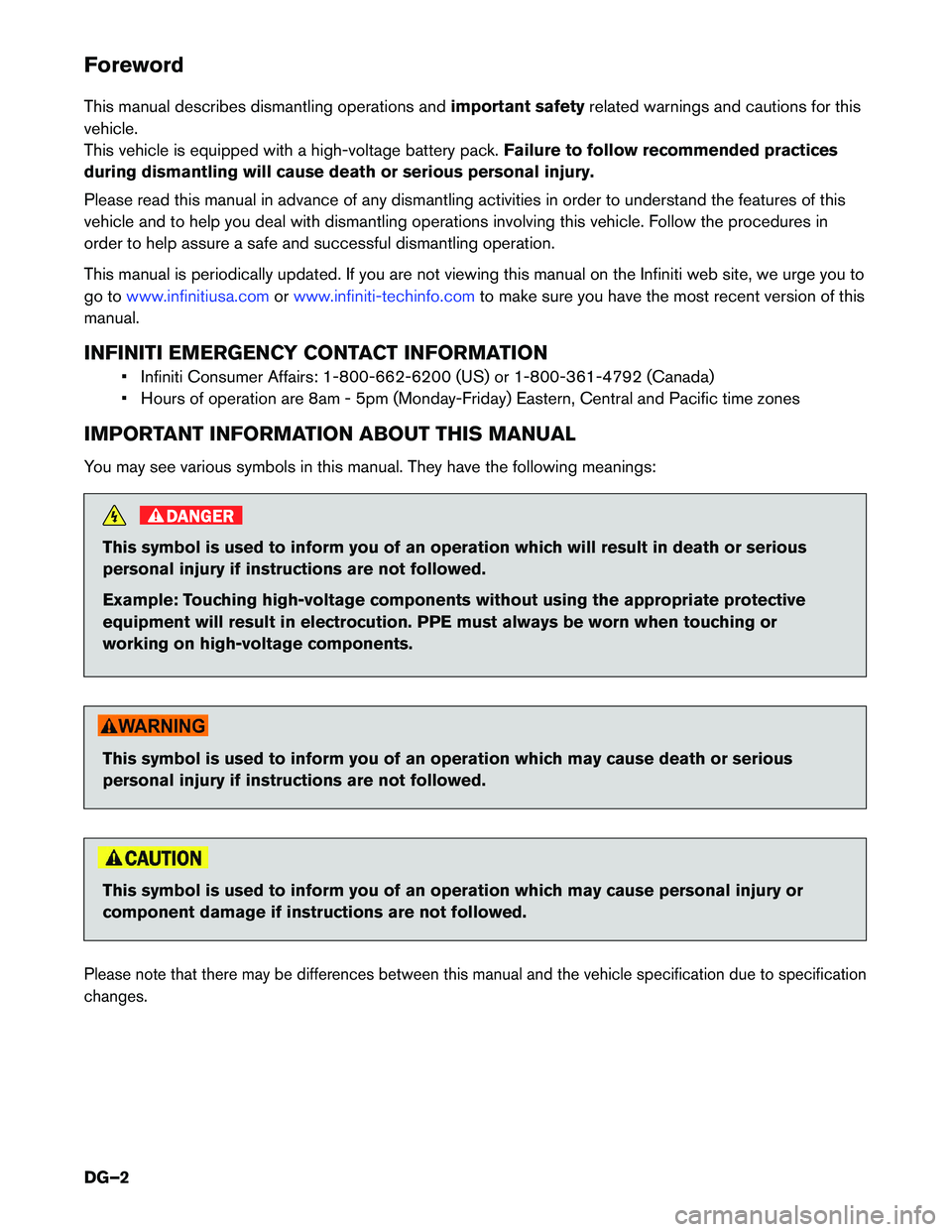
Foreword
This
manual describes dismantling operations and important safetyrelated warnings and cautions for this
vehicle.
This vehicle is equipped with a high-voltage battery pack. Failure to follow recommended practices
during dismantling will cause death or serious personal injury.
Please read this manual in advance of any dismantling activities in order to understand the features of this
vehicle and to help you deal with dismantling operations involving this vehicle. Follow the procedures in
order to help assure a safe and successful dismantling operation.
This manual is periodically updated. If you are not viewing this manual on the Infiniti web site, we urge you to
go to www.infinitiusa.com orwww.infiniti-techinfo.com to make sure you have the most recent version of this
manual.
INFINITI
EMERGENCY CONTACT INFORMATION
• Infiniti Consumer Affairs: 1-800-662-6200 (US) or 1-800-361-4792 (Canada)
• Hours of operation are 8am - 5pm (Monday-Friday) Eastern, Central and Pacific time zones
IMPORTANT INFORMATION ABOUT THIS MANUAL
You may see various symbols in this manual. They have the following meanings: DANGER
This symbol is used to inform you of an operation which will result in death or serious
personal
injury if instructions are not followed.
Example: Touching high-voltage components without using the appropriate protective
equipment will result in electrocution. PPE must always be worn when touching or
working on high-voltage components. This symbol is used to inform you of an operation which may cause death or serious
personal
injury if instructions are not followed. This symbol is used to inform you of an operation which may cause personal injury or
component
damage if instructions are not followed.
Please note that there may be differences between this manual and the vehicle specification due to specification
changes.
DG–2
Page 3 of 55
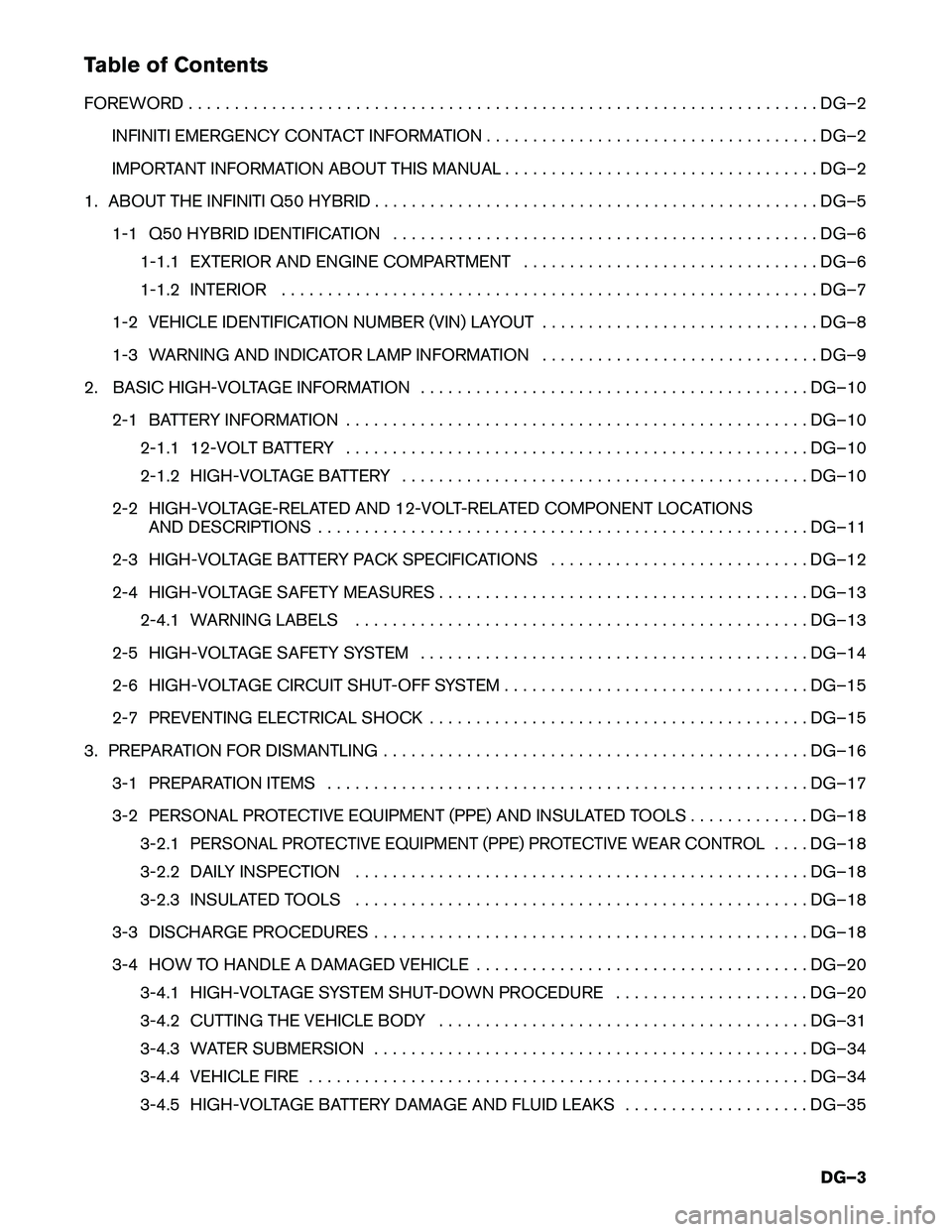
Table of Contents
FOREWORD
. . . . . . . . . . . . . . . . . . . . . . . . . . . . . . . . . . . . . . . . . . . . . . . . . . . . . . . . . . . . . . . . . . . . DG–2
INFINITI EMERGENCY CONTACT INFORMATION . . . . . . . . . . . . . . . . . . . . . . . . . . . . . . . . . . . . DG–2
IMPORTANT INFORMATION ABOUT THIS MANUAL . . . . . . . . . . . . . . . . . . . . . . . . . . . . . . . . . . DG–2
1. ABOUT THE INFINITI Q50 HYBRID . . . . . . . . . . . . . . . . . . . . . . . . . . . . . . . . . . . . . . . . . . . . . . . . DG–5
1-1 Q50 HYBRID IDENTIFICATION . . . . . . . . . . . . . . . . . . . . . . . . . . . . . . . . . . . . . . . . . . . . . . DG–6 1-1.1 EXTERIOR AND ENGINE COMPARTMENT . . . . . . . . . . . . . . . . . . . . . . . . . . . . . . . . DG–6
1-1.2 INTERIOR . . . . . . . . . . . . . . . . . . . . . . . . . . . . . . . . . . . . . . . . . . . . . . . . . . . . . . . . . . DG–7
1-2 VEHICLE IDENTIFICATION NUMBER (VIN) LAYOUT . . . . . . . . . . . . . . . . . . . . . . . . . . . . . . DG–8
1-3 WARNING AND INDICATOR LAMP INFORMATION . . . . . . . . . . . . . . . . . . . . . . . . . . . . . . DG–9
2. BASIC HIGH-VOLTAGE INFORMATION . . . . . . . . . . . . . . . . . . . . . . . . . . . . . . . . . . . . . . . . . . DG–10 2-1 BATTERY INFORMATION . . . . . . . . . . . . . . . . . . . . . . . . . . . . . . . . . . . . . . . . . . . . . . . . . . DG–10 2-1.1 12-VOLT BATTERY . . . . . . . . . . . . . . . . . . . . . . . . . . . . . . . . . . . . . . . . . . . . . . . . . . DG–10
2-1.2 HIGH-VOLTAGE BATTERY . . . . . . . . . . . . . . . . . . . . . . . . . . . . . . . . . . . . . . . . . . . . DG–10
2-2 HIGH-VOLTAGE-RELATED AND 12-VOLT-RELATED COMPONENT LOCATIONS AND DESCRIPTIONS . . . . . . . . . . . . . . . . . . . . . . . . . . . . . . . . . . . . . . . . . . . . . . . . . . . . . DG–11
2-3 HIGH-VOLTAGE BATTERY PACK SPECIFICATIONS . . . . . . . . . . . . . . . . . . . . . . . . . . . . DG–12
2-4 HIGH-VOLTAGE SAFETY MEASURES . . . . . . . . . . . . . . . . . . . . . . . . . . . . . . . . . . . . . . . . DG–13 2-4.1 WARNING LABELS . . . . . . . . . . . . . . . . . . . . . . . . . . . . . . . . . . . . . . . . . . . . . . . . . DG–13
2-5 HIGH-VOLTAGE SAFETY SYSTEM . . . . . . . . . . . . . . . . . . . . . . . . . . . . . . . . . . . . . . . . . . DG–14
2-6 HIGH-VOLTAGE CIRCUIT SHUT-OFF SYSTEM . . . . . . . . . . . . . . . . . . . . . . . . . . . . . . . . . DG–15
2-7 PREVENTING ELECTRICAL SHOCK . . . . . . . . . . . . . . . . . . . . . . . . . . . . . . . . . . . . . . . . . DG–15
3. PREPARATION FOR DISMANTLING . . . . . . . . . . . . . . . . . . . . . . . . . . . . . . . . . . . . . . . . . . . . . . DG–16
3-1 PREPARATION ITEMS . . . . . . . . . . . . . . . . . . . . . . . . . . . . . . . . . . . . . . . . . . . . . . . . . . . . DG–17
3-2 PERSONAL PROTECTIVE EQUIPMENT (PPE) AND INSULATED TOOLS . . . . . . . . . . . . . DG–183-2.1
PERSONAL PROTECTIVE EQUIPMENT (PPE) PROTECTIVE WEAR CONTROL. . . . DG–18
3-2.2 DAILY INSPECTION . . . . . . . . . . . . . . . . . . . . . . . . . . . . . . . . . . . . . . . . . . . . . . . . . DG–18
3-2.3 INSULATED TOOLS . . . . . . . . . . . . . . . . . . . . . . . . . . . . . . . . . . . . . . . . . . . . . . . . . DG–18
3-3 DISCHARGE PROCEDURES . . . . . . . . . . . . . . . . . . . . . . . . . . . . . . . . . . . . . . . . . . . . . . . DG–18
3-4 HOW TO HANDLE A DAMAGED VEHICLE . . . . . . . . . . . . . . . . . . . . . . . . . . . . . . . . . . . . DG–20 3-4.1 HIGH-VOLTAGE SYSTEM SHUT-DOWN PROCEDURE . . . . . . . . . . . . . . . . . . . . . DG–20
3-4.2 CUTTING THE VEHICLE BODY . . . . . . . . . . . . . . . . . . . . . . . . . . . . . . . . . . . . . . . . DG–31
3-4.3 WATER SUBMERSION . . . . . . . . . . . . . . . . . . . . . . . . . . . . . . . . . . . . . . . . . . . . . . . DG–34
3-4.4 VEHICLE FIRE . . . . . . . . . . . . . . . . . . . . . . . . . . . . . . . . . . . . . . . . . . . . . . . . . . . . . . DG–34
3-4.5 HIGH-VOLTAGE BATTERY DAMAGE AND FLUID LEAKS . . . . . . . . . . . . . . . . . . . . DG–35
DG–3
Page 9 of 55
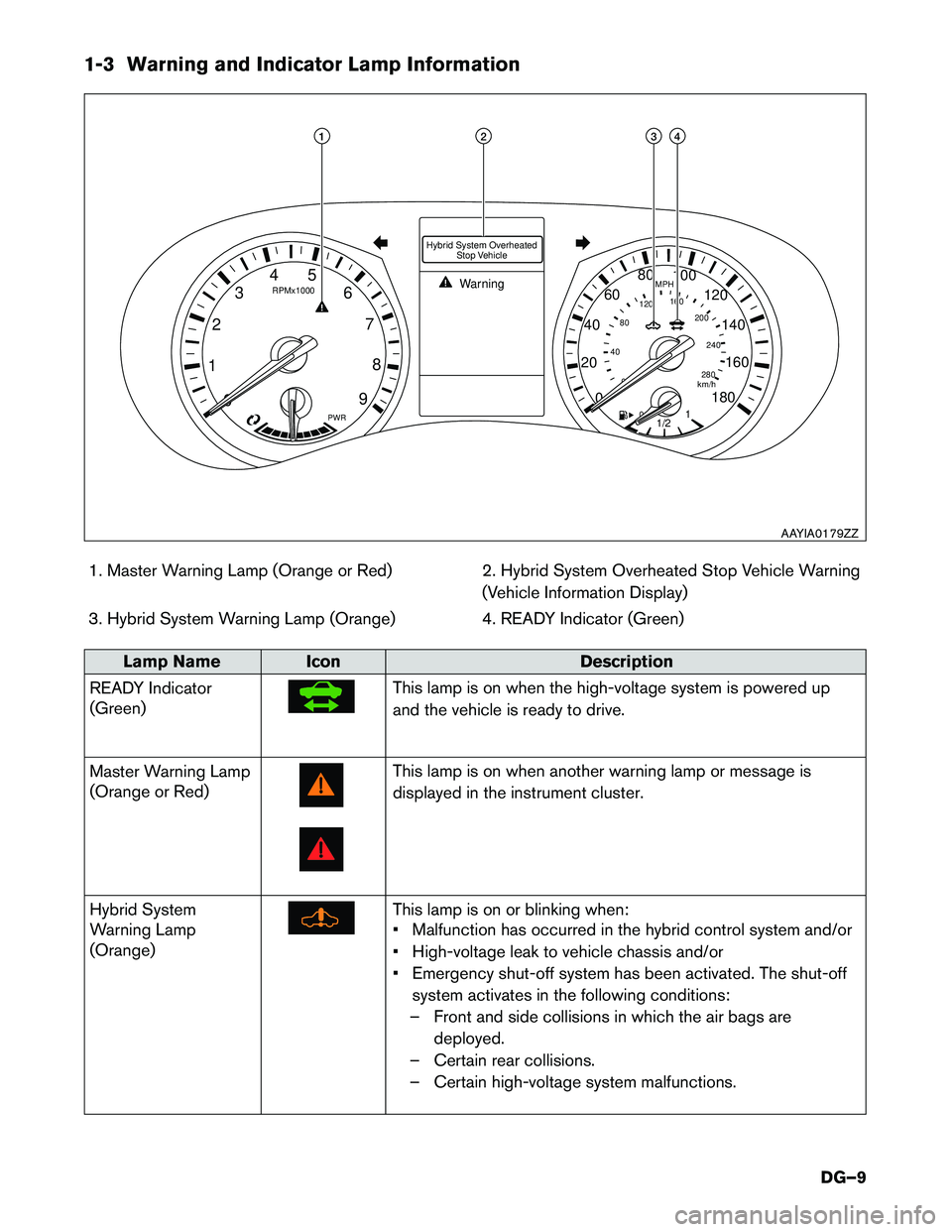
1-3 Warning and Indicator Lamp Information
1. Master Warning Lamp (Orange or Red) 2. Hybrid System Overheated Stop Vehicle Warning
(Vehicle Information Display)
3. Hybrid System Warning Lamp (Orange) 4. READY Indicator (Green)Lamp Name
Icon Description
READ
Y Indicator
(Green) This lamp is on when the high-voltage system is powered up
and
the vehicle is ready to drive.
Master Warning Lamp
(Orange or Red) This lamp is on when another warning lamp or message is
displayed
in the instrument cluster.
Hybrid System
Warning Lamp
(Orange) This lamp is on or blinking when:
•
Malfunction has occurred in the hybrid control system and/or
• High-voltage leak to vehicle chassis and/or
• Emergency shut-off system has been activated. The shut-off system activates in the following conditions:
– Front and side collisions in which the air bags are deployed.
– Certain rear collisions.
– Certain high-voltage system malfunctions. 00
0
40
80
120
160
200
240
280
km/h
MPH 20
40
1 2
3
4
5
6
7
8
9
0
PWR
RPMx1000
6080
100
120
140
160
180
1
1/2 1 2 3 4
Hybr
id System Overheated Stop Vehicle
Warning AAYIA0179ZZ
DG–9
Page 13 of 55
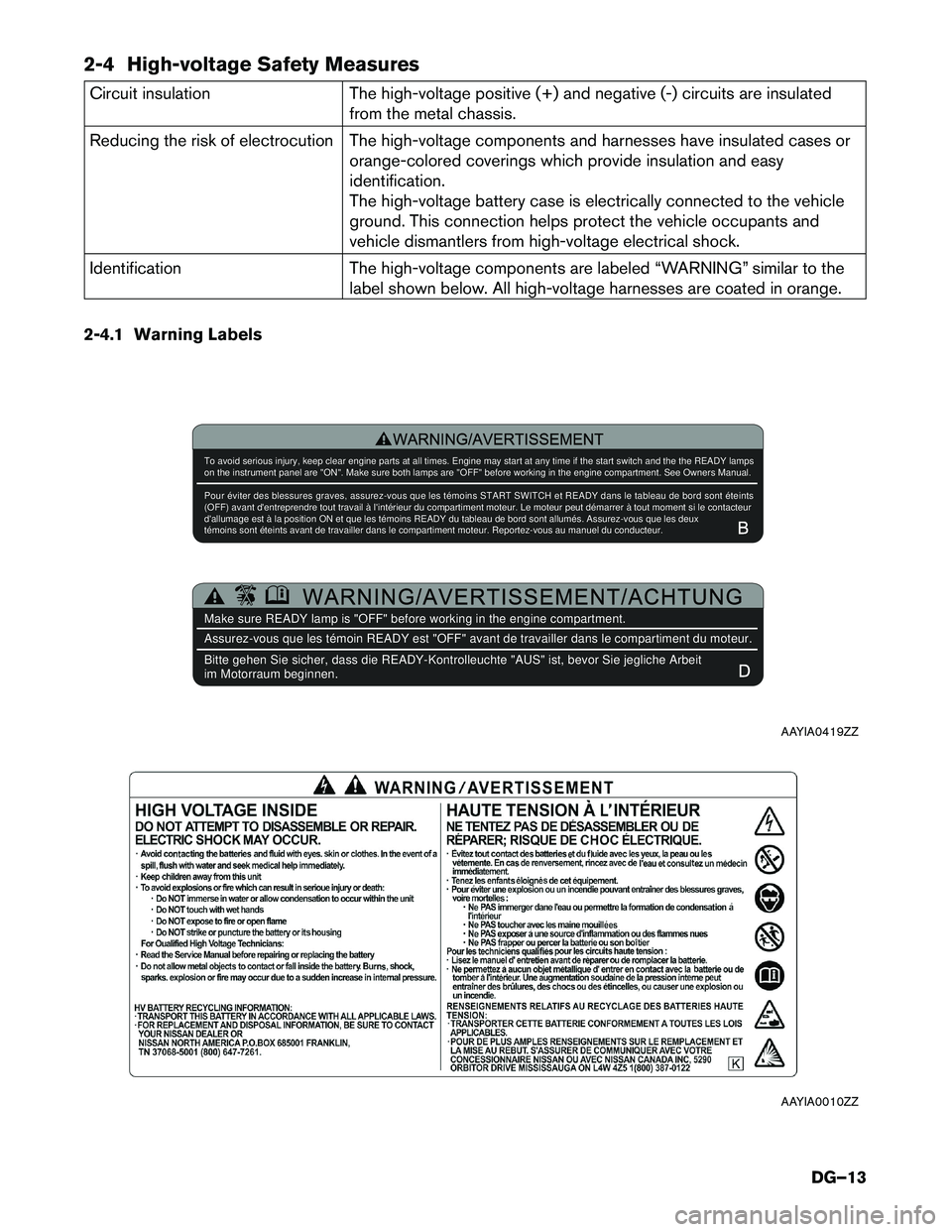
2-4 High-voltage Safety Measures
Circuit insulation
The high-voltage positive (+) and negative (-) circuits are insulated
from the metal chassis.
Reducing the risk of electrocution The high-voltage components and harnesses have insulated cases or orange-colored coverings which provide insulation and easy
identification.
The high-voltage battery case is electrically connected to the vehicle
ground. This connection helps protect the vehicle occupants and
vehicle dismantlers from high-voltage electrical shock.
Identification The high-voltage components are labeled “WARNING” similar to the
label shown below. All high-voltage harnesses are coated in orange.
2-4.1 Warning Labels WARNING/AVERTISSEMENT
To avoid serious injury, keep clear engine parts at all times. Engine ma\
y start at any time if the start switch and the the READY lamps
on the instrument panel are "ON". Make sure both lamps are "OFF" before \
working in the engine compartment. See Owners Manual.
P
our éviter des blessures graves, assurez-vous que les témoins START SWITCH et READY dans le tableau de bord sont éteints
(OFF) avant d'entreprendre tout travail à I'intérieur du compart\
iment moteur. Le moteur peut démarrer à tout moment si le contacte\
ur
d'allumage est à la position ON et que les témoins READY du tablea\
u de bord sont allumés. Assurez-vous que les deux
témoins sont éteints avant de travailler dans le compartiment mote\
ur. Reportez-vous au manuel du conducteur.
BW A R N I N G / A V E R T I S S E M E N T / A C H T U N G
Make sure READY lamp is "OFF" before working in the
engine compartment.
Assurez-vous que les témoin READY est "OFF" avant de travailler dans le compartiment du moteur.
Bitte gehen Sie sicher, dass die READY-Kontrolleuchte "AUS" ist, bevor Sie jegliche Arbeit
im Motorraum beginnen. D AAYIA0419ZZ
AAYIA0010ZZ
DG–13
Page 15 of 55
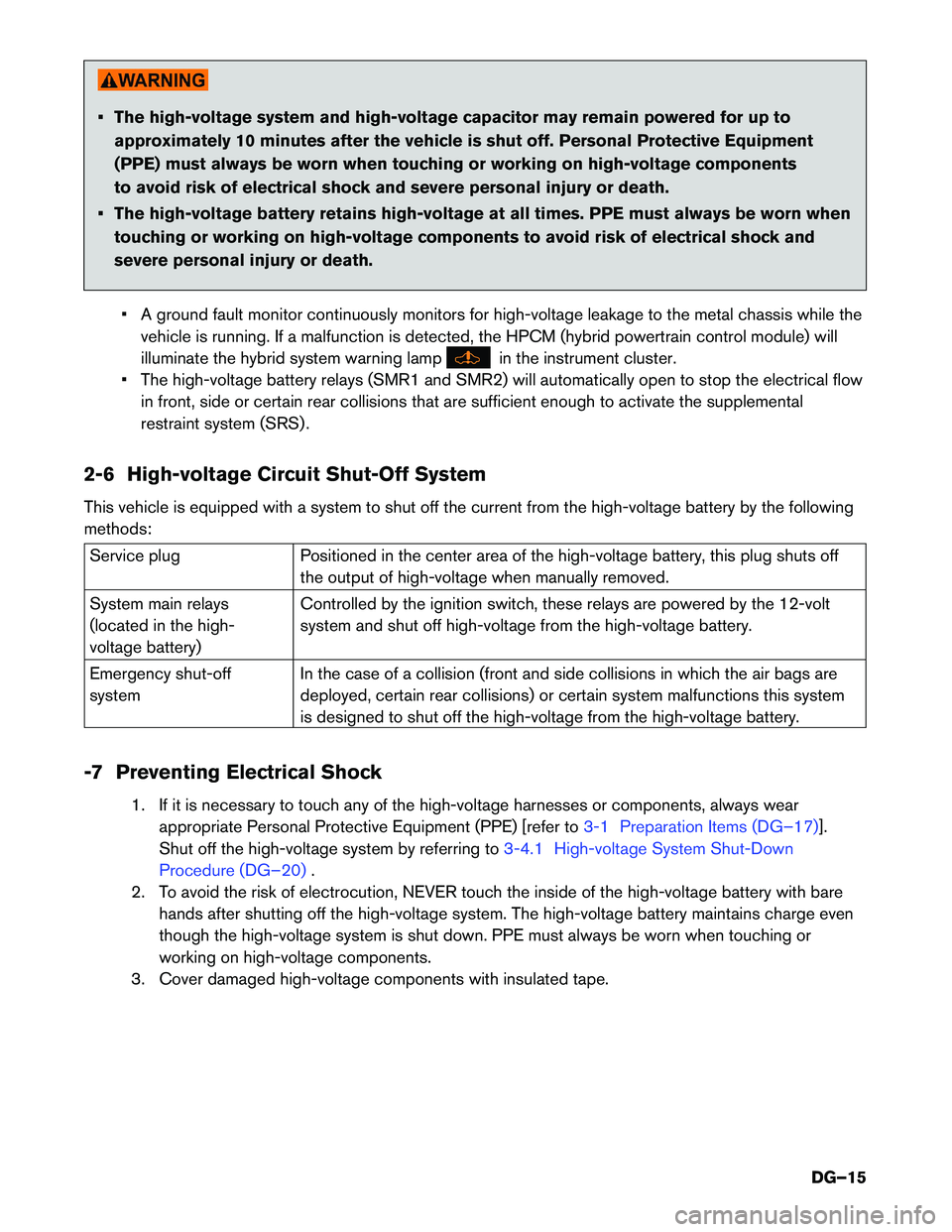
• The high-voltage system and high-voltage capacitor may remain powered for up to
approximately 10 minutes after the vehicle is shut off. Personal Protective Equipment
(PPE) must always be worn when touching or working on high-voltage components
to avoid risk of electrical shock and severe personal injury or death.
• The high-voltage battery retains high-voltage at all times. PPE must always be worn when touching or working on high-voltage components to avoid risk of electrical shock and
severe personal injury or death.
• A ground fault monitor continuously monitors for high-voltage leakage to the metal chassis while the vehicle is running. If a malfunction is detected, the HPCM (hybrid powertrain control module) will
illuminate the hybrid system warning lamp in the instrument cluster.
•
The high-voltage battery relays (SMR1 and SMR2) will automatically open to stop the electrical flow
in front, side or certain rear collisions that are sufficient enough to activate the supplemental
restraint system (SRS) .
2-6 High-voltage Circuit Shut-Off System
This vehicle is equipped with a system to shut off the current from the high-voltage battery by the following
methods: Service plug
Positioned in the center area of the high-voltage battery, this plug shuts off
the
output of high-voltage when manually removed.
System main relays
(located in the high-
voltage battery) Controlled by the ignition switch, these relays are powered by the 12-volt
system and shut off high-voltage from the high-voltage battery.
Emergency shut-off
system In the case of a collision (front and side collisions in which the air bags are
deployed, certain rear collisions) or certain system malfunctions this system
is designed to shut off the high-voltage from the high-voltage battery.
-7 Preventing Electrical Shock 1. If it is necessary to touch any of the high-voltage harnesses or components, always wearappropriate Personal Protective Equipment (PPE) [refer to 3-1 Preparation Items (DG–17)].
Shut
off the high-voltage system by referring to 3-4.1 High-voltage System Shut-Down
Procedure
(DG–20) .
2.
To avoid the risk of electrocution, NEVER touch the inside of the high-voltage battery with bare
hands after shutting off the high-voltage system. The high-voltage battery maintains charge even
though the high-voltage system is shut down. PPE must always be worn when touching or
working on high-voltage components.
3. Cover damaged high-voltage components with insulated tape.
DG–15
Page 19 of 55
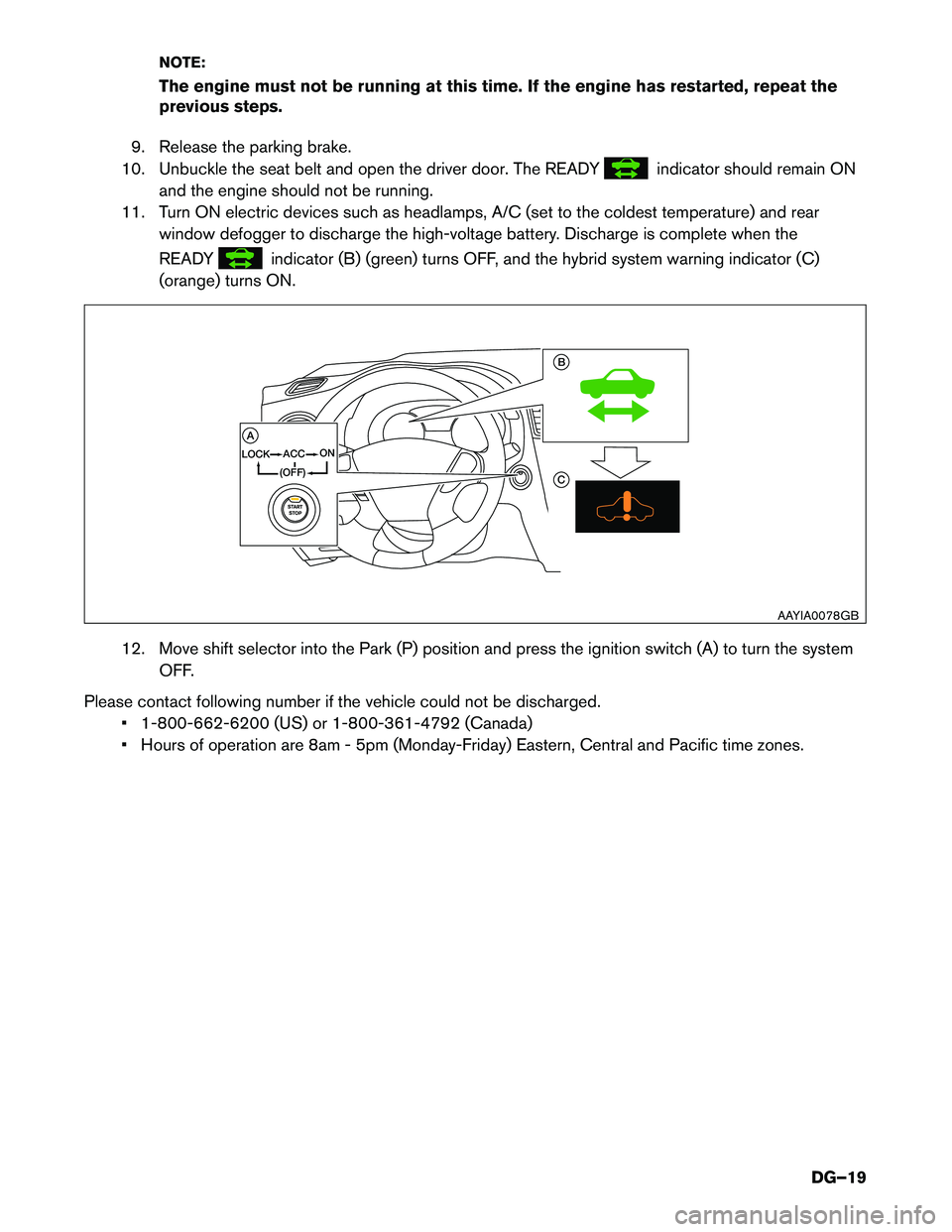
NOTE:
The
engine must not be running at this time. If the engine has restarted, repeat the
previous steps.
9. Release the parking brake.
10. Unbuckle the seat belt and open the driver door. The READY indicator should remain ON
and
the engine should not be running.
11. Turn ON electric devices such as headlamps, A/C (set to the coldest temperature) and rear window defogger to discharge the high-voltage battery. Discharge is complete when the
READY indicator (B) (green) turns OFF, and the hybrid system warning indicator (C)
(orange)
turns ON.
12. Move shift selector into the Park (P) position and press the ignition switch (A) to turn the system OFF.
Please contact following number if the vehicle could not be discharged. • 1-800-662-6200 (US) or 1-800-361-4792 (Canada)
• Hours of operation are 8am - 5pm (Monday-Friday) Eastern, Central and Pacific time zones. A B
CLOCK
ACC
(OFF)
ON
AAYIA0078GB
DG–19